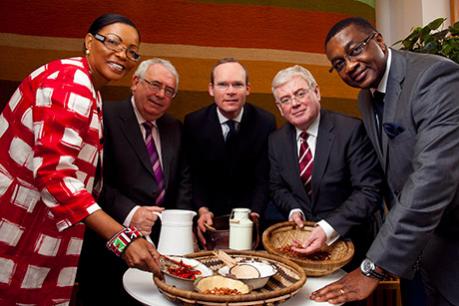Potential of trade and investment to drive progress highlighted at OECD
16/1/13
Minister Costello highlighted Irish Aid’s support to addressing the challenges faced by developing countries
Minister for Trade and Development Joe Costello highlights the potential for trade and investment to drive progress in the developing world
Minister for Trade and Development, Joe Costello, TD, highlighted the role of trade and investment in tackling global poverty during a keynote address to the Organisation for Economic Cooperation and Development (OECD) in Paris today.
Minister Costello said that the consistent message he receives from African Governments and businesspeople is that Africa is open for business. However, he noted that many developing countries still face significant challenges in building their capacity to trade.
Addressing the OECD’s Aid for Trade policy dialogue, Minister Costello said:
“Developing countries are changing – stronger economies, better education and technology are driving political and economic change. But lasting solutions need to be underpinned by increased economic activity within developing countries, which will lead to improved tax collection, foreign direct investment, greater integration into world markets and more two-way trade with the rest of the world.”
Minister Costello highlighted Irish Aid’s support to addressing the challenges faced by developing countries in building their capacity to trade with the world:
“Ireland supports our developing partners in Africa and Asia to increase their capacity to trade with the world. For example, we fund the United Nations’ Port Training Programme in Ghana, Namibia and Tanzania in Africa, and Indonesia, Malaysia and the Maldives in Asia. This programme harnesses the expertise of Dublin Port Authority, the Port of Cork and Belfast Harbour Commissioners to increase the capacity of these strategic African ports.
“Ireland also recognises the potential of the private sector to advance the aid for trade agenda. As part of the Department of Foreign Affairs and Trade’s Africa Strategy, Irish Aid is increasingly working to improve business environments in developing countries. One example of this is the Africa Agri-Food Development Fund, a joint initiative with the Department of Agriculture, Food and the Marine.
“Looking to the future, we must continue to work together to improve the trade and investment climate in developing countries to encourage responsible investment and promote the creation of sustainable employment. This is key to increasing the income and living standards of people in developing countries and putting their economies on a sound footing.”
Ends
17 January, 2013
Note for editors
- The OECD policy Dialogue on January 16 and 17 brings together stakeholders from developing and developed countries to discuss what needs to be done to support increased trade and development.
- The Aid for Trade initiative was launched by the World Trade Organisation in 2005 to foster international support for developing counties to overcome the structural and capacity limitations they face in maximising trade opportunities.
- Irish aid provides support to the major international organizations involved in trade-related capacity building, including the Advisory Centre for WTO Law, the WTO trade assistance programmes, the UN Conference on Trade and Development and the International Trade Centre.
- The Africa Agri-Food Development Fund brings the management skills and research capabilities of the Irish agri-business and State Agencies to the two countries being piloted under the scheme – Kenya and Tanzania.


